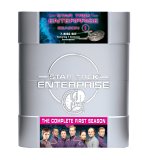| Reviews & Columns |
|
Reviews DVD TV on DVD Blu-ray 4K UHD International DVDs In Theaters Reviews by Studio Video Games Features Collector Series DVDs Easter Egg Database Interviews DVD Talk Radio Feature Articles Columns Anime Talk DVD Savant Horror DVDs The M.O.D. Squad Art House HD Talk Silent DVD
|
DVD Talk Forum |
|
|
| Resources |
|
DVD Price Search Customer Service #'s RCE Info Links |
|
Columns
|
|
|
Star Trek Enterprise - The Complete First Season
INTRODUCTION:
It's been a long road, getting from there to here. On September 8, 1966, "The Man Trap" was broadcast by NBC affiliates across the nation, and it sparked a television phenomenon the likes of which had never been seen before or since. 4 series, 26 seasons with over 600 episodes, 9 feature films, and 35 years later, executive producers Rick Berman and Brannon Braga bring us the 5th and, until further word, final series in Paramount's long-running mega-franchise known as Star Trek. Intended as a prequel and set a little over 100 years before James T. Kirk's historic "5-year mission", Enterprise follows the adventures of Captain Jonathan Archer (Scott Bakula) as he commands Earth's first Warp Five starship and ostensibly chronicles the events that would ultimately lead to the First Romulan War and the formation of the United Federation of Planets.
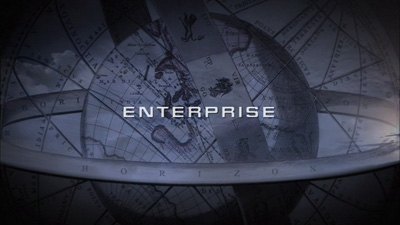
CONTENT:
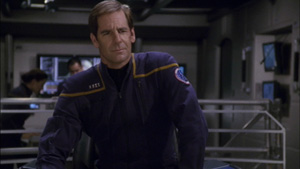 The year is 2151, and since first contact with the Vulcans after Zefram Cochrane's warp flight in 2063, Humans have been struggling to take to the stars and explore the Universe on their own. Hindering that effort, however, are those same Vulcans, who believe that Humanity is too volatile and impulsive to undertake interstellar flight without strict guidance. As the series begins, this issue has finally come to a head, and Jonathan Archer -- whose father spent most of his lifetime developing the Warp Five technology -- is preparing to lead the Enterprise NX-01 on its maiden voyage. Of course, in typical Trek fashion, circumstances arise that force them to launch before they are completely ready.
The year is 2151, and since first contact with the Vulcans after Zefram Cochrane's warp flight in 2063, Humans have been struggling to take to the stars and explore the Universe on their own. Hindering that effort, however, are those same Vulcans, who believe that Humanity is too volatile and impulsive to undertake interstellar flight without strict guidance. As the series begins, this issue has finally come to a head, and Jonathan Archer -- whose father spent most of his lifetime developing the Warp Five technology -- is preparing to lead the Enterprise NX-01 on its maiden voyage. Of course, in typical Trek fashion, circumstances arise that force them to launch before they are completely ready.
Jonathan Archer is intended as a throwback to the swashbuckling and adventuresome style of Jim Kirk, more akin to trailblazers like Chuck Yeager than polished diplomats like Jean-Luc Picard. He is a flawed character who harbors resentment towards the Vulcans who held back his father's research, and he is often prone to making impulsive decisions and sidestepping diplomatic protocol. At least, that seems to be the original intent. The final result, however, is only mildly successful, as Archer vacillates between a strong and determined presence and the "oh boy" wide-eyed stylings of Dr. Sam Beckett. While it is clear the producers wanted Archer to have an identifiable everyman quality that separated him from the near-perfection of characters like Kirk and Picard, there is a hokey and annoying aspect of him that creeps in from time to time, making it difficult to take him seriously as a Captain, particularly when delivering a holier-than-thou morality speech to the camera.
Assisting Archer is his longtime friend and Chief Engineer Charles Tucker, III (Connor Trinneer), a.k.a. "Trip". Boasting a charming personality, a disarming Southern accent, and a sarcastic sense of humor, Trip is the "Bones" McCoy of the series. Never shying away from expressing his opinion, he is fiercely loyal but often gets frustrated with following protocol. Although he technically is not the First Officer of the ship, Archer relies heavily on his friendship with Trip, and this relationship is one of the few things that works very well on the series. The style and personality of Trinneer's performance turns many an average scene into gold simply because of his presence. While Archer seems scripted to be an everyman style of character, it is Trip who succeeds in this role the most.
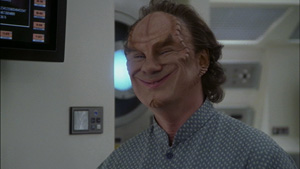
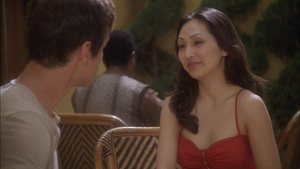
The third piece in the command triumvirate is Sub-Commander T'Pol (Jolene Blalock). In an attempt to echo the Kirk-Spock-McCoy dynamic, numerous scenes are structured around this threesome, and despite the immense likeability of Commander Tucker, the dynamic is a failure because of T'Pol. Seemingly cast more because of her big ... ears ... instead of her acting ability, Blalock's performance as a science officer from the Vulcan Consulate on Earth lacks the subtlety and brilliance of the work done by Leonard Nimoy in the original series. In her defense, the producers have noted that these Vulcans follow a different philosophy than those of the 23rd Century, and so comparing T'Pol to Spock is inappropriate. Fair enough. Nimoy set the standard for the entire Vulcan culture, and so comparing anyone to him is probably unfair; however, compared against the performances of other Vulcans on this series (Gary Graham and Bruce French among others), the character of T'Pol is equally lacking. As the show progresses, the character becomes better defined and less of a distracting annoyance, but for most of this first season, there is a lack of consistency and believability to T'Pol that harms the overall structure of the show.
Rounding out the rest of the main cast are Dr. Phlox (John Billingsley), a congenial Denobulan who accompanies the crew on their first mission and then remains on board in hopes of studying the wide array of alien species they are likely to meet; Ensign Hoshi Sato (Linda Park), an expert linguist but a classic white-knuckle flier and reluctant member of the crew; Lieutenant Malcolm Reed (Dominic Keating), the ship's Armory Officer (something new to Trek, although not too much different from a Security Officer) and descendent from a long line of British Royal Navy men; and Ensign Travis Mayweather (Anthony Montgomery), a "boomer" (born and raised on a space vessel) who ... um ... well, he's a boomer, and ... erm ... he eats and breathes. Finally, there's Porthos, the Captain's loveable beagle and a member of the crew who at times seems to have more depth of character than some of the Humans.
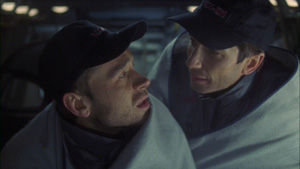
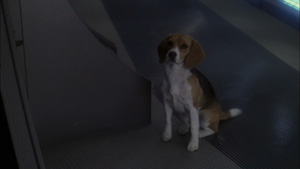
With the creation of this 5th major series in the franchise, the producers made significant efforts to distance themselves from the very franchise that enabled this show to exist in the first place. First and most notably is the name of the show. Ditching the Star Trek title, when the show originally aired, it was simply called Enterprise. However, sagging ratings and a need to rely on traditional fandom caused them to change the name in the third season and retrofit it to this DVD release. Also receiving a significant amount of attention is the change in the opening title sequence. Traditionally, Star Trek series have been marked by beautiful scores and title sequences that attempted to capture the majesty of space exploration; however, with this new series, Berman and Braga enlisted the services of ubiquitous schlock songstress Diane Warren to repurpose her sappy song "Faith of the Heart" from the Patch Adams soundtrack. Played against fantastic visuals of the evolution of exploration, from sea-faring vessels to our ventures into space, this usage of such a cheesy pop tune angered fans and created quite an uproar. While my reaction to it is not nearly as visceral as that of others, and over time I have become accustomed to it, it has never felt appropriate and serves only to undercut the emotional strength of the images on screen.
Another area where Enterprise wanted to distinguish itself from other shows is in the characterization. On the presumption that previous Trek adventures were more plot-driven, Berman and Braga sought to make this latest series less about plot and more about the individuals themselves. One of the great criticisms of Trek is that the characters rarely change: they're model representatives of perfection during the first episode, and they're no different in the last. While I disagree with that assessment in some cases (Picard's experiences with the Borg and the Kataan, Data's entire character arc, and nearly everyone on Deep Space Nine), it's a fair criticism, and Trek has never approached the character growth found on shows like Babylon 5 or Farscape. With Enterprise, this was to change, and in many of the early episodes of this first season, the series finds a surprising level of success on that front. Each of the minor characters gets his own developing episode, and while Travis's episode continues to beat the proverbial horse that he's a boomer (and seemingly lacks any other distinguishing characteristic), Hoshi's growth from a scared little girl is handled in a convincing manner, and a couple of episodes do a solid job with the introduction of Dr. Phlox. Even Lt. Reed, about whom the crew seems to know very little (a running gag during his Birthday), finds some much needed development when trapped alone in a dying shuttle with Trip in "Shuttlepod One". Sadly, these moments are sparse after the initial episodes, and before too long, the series finds itself following familiar episodic paths and leaning on a limited set of characteristics instead of developing new ones.
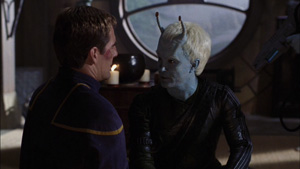
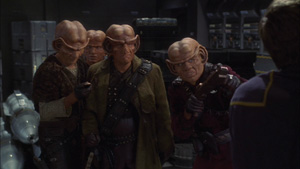
Enterprise also introduces a new group of interesting supporting characters who recur from time to time. The most effective of these is the remarkably talented Jeffrey Combs in the role of an Andorian commander named Shran. Along with the Tellerites, the Andorians were one of the founding members of the United Federation of Planets, and one of the visions of this new show was to give some insight into just how this Federation was actually formed. While Trek has focused heavily on two of the charter members of the UFP, the Humans and Vulcans, very little is known about the other two. With "The Andorian Incident" and "Shadows of P'Jem", the audience learns quite a bit more about the relationship between the Andorians and the Vulcans, and much of this is accomplished through the great work of Combs. Combs also provides a fun turn as Krem, one of a team of bumbling Ferengi in "Acquisition", including other Trek veterans Ethan Phillips and Clint Howard. Another fun recurring character is Crewman Cutler, portrayed by the late and dearly missed Kellie Waymire, who shows up periodically as a friend and sometimes assistant to Dr. Phlox. She adds a level of warmth and heart that is sometimes missing from the show. One supporting character who does not work, however, is Admiral Forrest. Vaughn Armstrong has the unique distinction of playing the most alien characters in the history of Star Trek, but his effort as a Human is lackluster at best. While Archer sometimes seems inadequate as a Captain, it is nothing compared to Forrest's inadequacies as an Admiral. Having seen Armstrong deliver impressive performances on stage as well as his numerous strong outings behind alien make-up, it was surprising to me that he would be such a failure in this role.
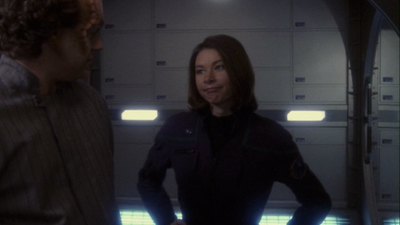
For those who have watched Enterprise on UPN these past 4 years, it's easy to forget how promising this show's first season was in light of how completely dreadful the following two seasons would be. Reminiscent of the original series, many of the episodes in this season rely not on technobabble and last-second dei ex machinis but good old-fashioned Human ingenuity. The plot resolutions in the early episodes are both plausible and effective, and whether it be a well-crafted and manually executed plan or an appeal to the antagonist's better sensibilities, these resolutions were a reminder of how the franchise should be, something that was lost during most of the Voyager run. Also effective was capturing the newness and sense of wonder associated with space exploration. There is a real sense of discovery and advancement in the early episodes.
Unfortunately, for all the strength of these early episodes, Enterprise drastically undercuts itself in a couple of key areas, and the blame for these issues likely rests squarely on the shoulders of Rick Berman and Brannon Braga. First and foremost is the insultingly adolescent approach to sexuality. Berman and Braga have essentially admitted that this was an overt goal in the creation of the show, and the fact that they do not apologize for it underscores how little respect they have for the viewing audience. The frequency with which T'Pol and Trip needlessly end up on screen in their underwear or other gratuitous clothing is really quite silly. Trek has always featured beautiful women and attractive men, and it has never shied away from sexuality; however, with the latter seasons of Voyager and now carrying over to Enterprise, it has taken on a much more immature and obvious tone that harms the overall content of the show.
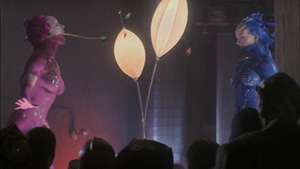
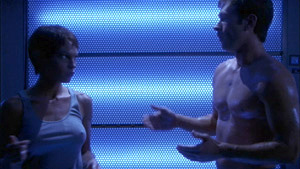
Even more counterproductive to the quality of the series as a whole is the long-running obsession with time travel. Interpreting time as a linear progression, time travel is logically suspect to begin with, so presenting dramatic stories based within the subject requires a level of sophistication to keep the plot from completely crumbling underneath itself. This requirement seems completely lost on Berman and Braga, and just when Enterprise starts to get interesting and show some real promise, it comes crashing down with an over-arcing plot about the "Temporal Cold War" with numerous factions traveling through time attacking and manipulating Archer and the crew and slowly building a convoluted and pointless plot that would become an albatross around the show's neck in this and subsequent seasons. Listening to the commentary on the pilot episode, you realize that the producers didn't really have much of a plan for what they wanted to do with the story; they just thought it "sounded cool". Sure, it sounds cool, but unless it makes sense on some level (accepting a reasonable suspension of disbelief), it will be a dramatic failure ... and that's what happens here. As a one-off incident, it would not be such a big deal, but this failure would become a running theme through the show's entire run that would, in large part in my opinion, ultimately lead to its cancellation.
Yet another area where this latest incarnation of the Trek franchise misses its mark is in its attempts at social commentary. For all the cheesy sets and silly special effects, the original Star Trek became the international phenomenon it is today because of its analysis of the human condition and its ability to hold a mirror up to our society and point out our numerous flaws, all the while showing us something toward which we could strive. Enterprise is a new breed of show, and it makes no apologies for going after a newer and younger audience, but it does attempt social commentary on a few occasions, and instead of being insightful, it's just preachy and annoying. One of the worst of these efforts is "Detained", a commentary on internment camps in World War II. It's ham-fisted and obvious and lacks the same punch of its predecessors. An episode like "Let That Be Your Last Battlefield" from the original series is one of the cheesiest of them all, and yet it still held a mirror up to the current audience of its time and said, "this is how silly we look!" Shows like this were powerful and effective and really made the audience think about the world around them. With "Detained" and other similar episodes, there is no greater insight to be found, no portrayal of modern society's flaws through a futuristic setting. It's simply a preachy tale about something the audience already considers to be a black mark on history, and watching it provides no growth or additional value.
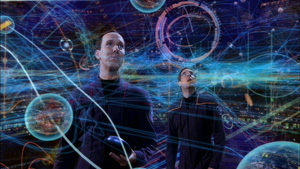
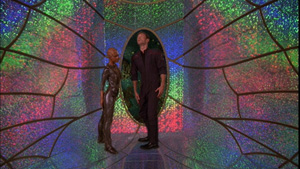
Finally, Enterprise is awfully self-referential to the Trek Universe. In moderation, this could be a very good thing and a wonderful nod to the fans. Naming Admirals "Forrest" and "Leonard" is a great touch, and having Hoshi use an ear-piece and T'Pol use a retractable viewer are certainly fun little throwbacks to the original series. However, there are times where the writers really take this approach to a downright nauseating level. In "Dear Doctor", one of the show's best episodes in spite of this, Archer delivers a painfully hokey monologue about needing "some sort of doctrine ... that tells us what we can and can't do out here," and then to hammer home the point, dramatically pauses before referring to it as a "directive." Worse, a similar scene is played out again, this time with T'Pol later on in the season. It's just too much, and the writers do it over and over again, almost as if they feel that such winks at the camera are a valid substitute for fully embracing the prequel concept in a legitimate storytelling capacity.
On the whole, while often flawed, I found that I enjoyed re-watching many of the episodes in this first season of Enterprise. With the dreadful dragging out of the Temporal Cold War in addition to the upcoming Xindi foolishness, seasons two and three are often so bad as to overshadow much of the promise found in these first 25 episodes. The wonder and adventure of Earth's first deep-space exploration is captured in the early parts of the season, and there is a healthy amount of character development to set the show apart from others. Also successful are numerous plots that are resolved without the need of technobabble. Unfortunately, as the season wears on, the quality starts to decrease pretty rapidly, plots from previous Trek incarnations are rehashed with less effectiveness, and by the cliffhanging and borderline absurd season finale, you get the feeling there isn't too much creative steam left in this show and wonder what hope there can be for the future.

PRESENTATION:
PACKAGING
The first season of Enterprise is presented in probably my least favorite packaging of all the television DVDs I own. The discs themselves are quite boring, featuring a minimalist silver color and blue writing that shows the episode names and dates in addition to quite a bit of annoying production data like copyrights and ratings. While they somewhat echo the militaristic feel of the set design, they're not particularly pleasing. These discs snap into single-sheet clear blue plastic containers that are attached at the spine by clear tape, similar to those from the other series sets, but with the full rectangular case height instead of the smaller compact disc sized ones from the original series release. This stack of blue containers slides into a clear plastic sleeve adorned with series logos, and the whole package fits snugly within an oversized, thick plastic clamshell outer casing. The total package is significantly larger than most DVD sets and likely will not fit on any dedicated DVD shelf without an extra inch or two of depth. Worse, the rounded edges and embossed outer logo make it so that stacking is not an option either. The good news is that structurally, it's sturdy enough to survive a Eugenics War or two. With a special series like Band of Brothers, I can understand the desire for uniquely oversized collectible packaging, but the design of this set, combined with its laughably typical price, just reeks of arrogance. This set is not meant to be shelved with others, but to perch alone and laugh at you for buying it.
Of note, "Sleeping Dogs" and "Shadows of P'Jem" are mislabeled on the menus for Disc #4.
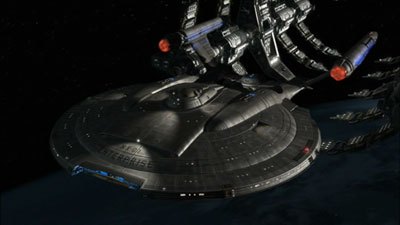
AUDIO/VIDEO
This Enterprise release is brought to us in anamorphically enhanced widescreen, and it looks pretty darn good. I caught some slight aliasing in a few places, and there were some spots where I didn't feel the black levels were quite perfect, but on the whole, this visual presentation is just what you would expect from a modern television show that is shot on the kind of budget Paramount provides this franchise. One drawback is that the special effects are so clean that there is a visible grain disparity between the practical and optical sequences.
The audio presentation is more of the same. Released in Dolby Digital 5.1, the audio is very clear and clean, and the mixing makes good use of the surround channels. Outdoor sequences effectively distribute ambient sounds, and action sequences provide good frame of reference when it comes to spatial movement. For a show that uses so many special effects, I was pleased that dialogue sequences were never outmatched by background noises and effects. While neither the audio nor the video is spectacular or worthy of special notice, it is more than adequate, and viewers will be pleased with the result.
WHISTLES & BELLS:
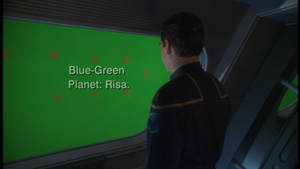 The first season of Enterprise contains a decent array of extras, although none of the individual features is especially interesting on its own. Along with the episodes themselves is a single audio commentary from producers Rick Berman and Brannon Braga on the pilot episode "Broken Bow". After listening to them talk for a while, I wasn't overly disappointed that they didn't provide any more commentaries. It is a moderately interesting listen, mostly to hear their justifications for some of the controversial decisions they made. Along with some of their comments on the featurettes, it's pretty clear these two don't have very much respect for their audience. "Broken Bow" also contains a "text commentary" from technical adviser/consultant and all-around Trek gurus Denise and Michael Okuda. While I think I would prefer to hear the personalities of those involved with the production of a show, there's a certain unique quality to these text commentaries, the most notable of which being that you can watch the full episode (audio included) with the commentary all at the same time. Along with the pilot episode, the Okudas also provide text for "The Andorian Incident" and "Vox Sola", and each of them is a mix of interesting tidbits on the production of the show, biographical information on the background characters with whom you may not be familiar, and general Trek trivia, all with a healthy dose of humor. I recommend turning these on while watching the episodes, as for the most part, they're pretty interesting, and in the case of "Vox Sola", more interesting than the actual episode.
The first season of Enterprise contains a decent array of extras, although none of the individual features is especially interesting on its own. Along with the episodes themselves is a single audio commentary from producers Rick Berman and Brannon Braga on the pilot episode "Broken Bow". After listening to them talk for a while, I wasn't overly disappointed that they didn't provide any more commentaries. It is a moderately interesting listen, mostly to hear their justifications for some of the controversial decisions they made. Along with some of their comments on the featurettes, it's pretty clear these two don't have very much respect for their audience. "Broken Bow" also contains a "text commentary" from technical adviser/consultant and all-around Trek gurus Denise and Michael Okuda. While I think I would prefer to hear the personalities of those involved with the production of a show, there's a certain unique quality to these text commentaries, the most notable of which being that you can watch the full episode (audio included) with the commentary all at the same time. Along with the pilot episode, the Okudas also provide text for "The Andorian Incident" and "Vox Sola", and each of them is a mix of interesting tidbits on the production of the show, biographical information on the background characters with whom you may not be familiar, and general Trek trivia, all with a healthy dose of humor. I recommend turning these on while watching the episodes, as for the most part, they're pretty interesting, and in the case of "Vox Sola", more interesting than the actual episode.
Mixed in among the episodes are a few deleted scenes here and there, and while some of them are interesting, most are obvious why they were deleted. One nice aspect about these is that scenes that were trimmed for time are included in their entirety with the part that was left in the episode shown in black and white and the part that was cut shown in color. That way the viewer can see the piece as it was intended while easily being able to see how it was changed.
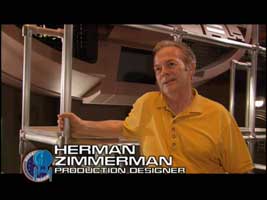
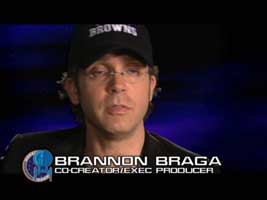
On the seventh disc are a number of very short featurettes, some more interesting than others, but all very short. "Creating Enterprise" is an early promotional bit that briefly covers the basic plot of the show and its characters but doesn't go into much depth. "O Captain! My Captain! A Profile of Scott Bakula" is a series of interviews with cast members and crew who think Scott Bakula is the nicest man on the face of the Earth and a discussion of how he is not just the Captain of the ship but the show as well. "Cast Impressions: Season One" gives each of the main actors a chance to talk about his character and the way it is approached. "Inside Shuttlepod One" is a short piece about 8 minutes in length with Trinneer and Keating recounting their experience on one of the season's better efforts, "Shuttlepod One", as well as some thoughts from Berman and Braga on that same episode.
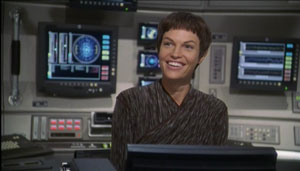 Continuing these features and getting thinner with each successive one is "Star Trek Time Travel: Temporal Cold Wars and Beyond" that very briefly shows some clips of the producers rambling about how great time travel is and then a long series of screenshots and brief explanations from all the Trek episodes and films that have used the device in the past. It plays almost like a defense, like "We're not so bad. Look how many times other people abused the concept!" "Enterprise Secrets" is hilariously short and provides less-than-detailed insight from David G. Trotti (2nd assistant director) into two of the effects used on the show. "Admiral Forrest Takes Center Stage" focuses on Vaughn Armstrong's long experience with the show and how he finally got a job playing a Human. "Enterprise Outtakes" runs just under 10 minutes and is a series of goofs and flubs from the filming of the show, and as these things usually are, it is pretty entertaining and leaves you wanting to see more. Finally, and predictably, Paramount includes some marketing with a trailer for the "Borg Invasion 4D" ride at Star Trek: The Experience in Las Vegas.
Continuing these features and getting thinner with each successive one is "Star Trek Time Travel: Temporal Cold Wars and Beyond" that very briefly shows some clips of the producers rambling about how great time travel is and then a long series of screenshots and brief explanations from all the Trek episodes and films that have used the device in the past. It plays almost like a defense, like "We're not so bad. Look how many times other people abused the concept!" "Enterprise Secrets" is hilariously short and provides less-than-detailed insight from David G. Trotti (2nd assistant director) into two of the effects used on the show. "Admiral Forrest Takes Center Stage" focuses on Vaughn Armstrong's long experience with the show and how he finally got a job playing a Human. "Enterprise Outtakes" runs just under 10 minutes and is a series of goofs and flubs from the filming of the show, and as these things usually are, it is pretty entertaining and leaves you wanting to see more. Finally, and predictably, Paramount includes some marketing with a trailer for the "Borg Invasion 4D" ride at Star Trek: The Experience in Las Vegas.
In addition, three Easter Eggs appear on the final disc and can be played by selecting the Dorsal and Fore/Aft view panels of the Enterprise NX-01 in the "Special Features" section. "NX-01 FILE 01" features Jolene Blalock briefly comparing the situation with the Vulcans in "Shadows of P'Jem" to that of today's Catholic Church. "NX-01 FILE 02" shows just over 2 minutes of information from Dan Curry (Visual Effects Producer) on the Klingon exteriors used in "Broken Bow". Lastly, "NX-01 FILE 03" contains 5 minutes with graphical artist Geoffrey Mandel discussing various approaches to the ship interiors on both the Enterprise NX-01 as well as Ferengi and Vulcan vessels. While there's an inherent novelty to the "Easter Egg" concept, none of these is particularly interesting or in-depth, and they provide little more than fluff.
NB: The featurettes seem relatively spoiler free, but if you have not seen subsequent seasons, stay away from the audio and text commentaries, as they reveal pretty much every major plot point through season three and into season four.
CONCLUDING THOUGHTS:
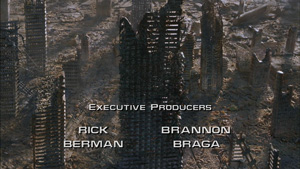 Since its premiere episode, Enterprise has been a polarizing show. Longtime fans of the original series have been very critical of it and rightfully so. From listening to the producers, it seems clear that the dedicated fans who have been around for decades were not necessarily the primary audience for which this series was aiming. Some fans have complained about continuity issues or dislike of the theme song, and while those are issues I certainly care about, they are superficial when compared to whether or not the series is dramatically effective and compelling. In the case of the first season of Enterprise, many of the early episodes are dramatically effective and exhibit a quality that is all but lost in the following seasons, but aside from a couple of strong efforts like "Dear Doctor" and "Shuttlepod One", it is rarely compelling. Watching this season through for the second time, I was happy to recall how many of the episodes were not terrible and how much promise there was early on, but rarely did this season exhibit anything more than simply above average entertainment, and unlike previous Trek series, I do not see much value in re-watching it over time. Normally I try to give my recommendations based solely on the content and not the pricing, but in this case, expecting anywhere in the neighborhood of $100.00 for this set is such egregious fandom abuse (I know this is standard Trek pricing, but it doesn't make it right), and the packaging is so obnoxious that I just cannot bring myself to recommend that you spend your hard-earned money to actually own this set. 99% of the people who read this review have already made up their minds on whether they are going to purchase this or not, and I suspect I'll hear from more than a few of you ;), but for the 1% of you who have not seen the show before and are genuinely interested in checking it out, I suggest you Rent It first.
Since its premiere episode, Enterprise has been a polarizing show. Longtime fans of the original series have been very critical of it and rightfully so. From listening to the producers, it seems clear that the dedicated fans who have been around for decades were not necessarily the primary audience for which this series was aiming. Some fans have complained about continuity issues or dislike of the theme song, and while those are issues I certainly care about, they are superficial when compared to whether or not the series is dramatically effective and compelling. In the case of the first season of Enterprise, many of the early episodes are dramatically effective and exhibit a quality that is all but lost in the following seasons, but aside from a couple of strong efforts like "Dear Doctor" and "Shuttlepod One", it is rarely compelling. Watching this season through for the second time, I was happy to recall how many of the episodes were not terrible and how much promise there was early on, but rarely did this season exhibit anything more than simply above average entertainment, and unlike previous Trek series, I do not see much value in re-watching it over time. Normally I try to give my recommendations based solely on the content and not the pricing, but in this case, expecting anywhere in the neighborhood of $100.00 for this set is such egregious fandom abuse (I know this is standard Trek pricing, but it doesn't make it right), and the packaging is so obnoxious that I just cannot bring myself to recommend that you spend your hard-earned money to actually own this set. 99% of the people who read this review have already made up their minds on whether they are going to purchase this or not, and I suspect I'll hear from more than a few of you ;), but for the 1% of you who have not seen the show before and are genuinely interested in checking it out, I suggest you Rent It first.
|
| Popular Reviews |
| Sponsored Links |
|
|
| Sponsored Links |
|
|
| Release List | Reviews | Shop | Newsletter | Forum | DVD Giveaways | Blu-Ray | Advertise |
|
Copyright 2024 DVDTalk.com All Rights Reserved. Legal Info, Privacy Policy, Terms of Use,
Manage Preferences,
Your Privacy Choices | |||||||









